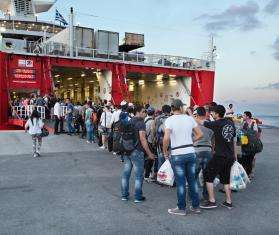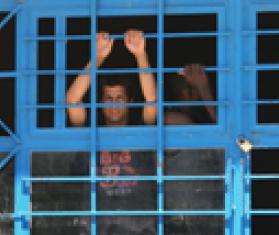Yuli*, from Cuba, sought asylum in Greece after a torturous and dangerous journey that was all the more difficult as a black, transgender woman.
Tall, confident, and exuding warmth, she shudders as she remembers the journey from Russia, one of the few countries where Cuban passports are accepted: the endless walking, the bus trips, the border guard refusals, the bullying and aggression, and the days and nights spent in a men’s jail, before she was able to reach safety. Here, Yuli shares her experience with the day care center in Athens that is run by Doctors Without Borders/Médecins Sans Frontières (MSF), which currently offers a comprehensive package of multidisciplinary services focusing on sexual and reproductive health, non-communicable diseases, and mental health support.
Discrimination in Cuba
Like all the trans women that are here in Greece, I decided to leave Cuba because of the system. In general, the system in Cuba doesn’t understand trans people. You are escoria [scum] because you feel or you identify as a woman. They think that you are crazy. They don't give you opportunities like a job or health care or any help. The system is not interested in protecting LGBTQI+ people.
I made the atravesia [crossing] to find freedom. When you make this decision to leave your country it's because you can no longer live there. For me it was better to die on the way than to live in Cuba.
March 07 02:09 PM
How women are overcoming stigma and promoting sexual health
On International Women's Day, remember that millions of women and girls around the world cannot access necessary health care.
Read more
Standing up for the trans community
I want to be the voice for the trans community from my country. It is very important that trans people have social and medical support because most of the trans people who come here do not have any medication. They experience sexually transmitted diseases—that is life. But it is very difficult to find medical support.
When you come to a new country that is not your culture, not your language, and you need to show your body at the hospital, they don't understand exactly, they don't know anything about you. I know that the Greek medical system is very good. But the problem is the gender. We are trans, and mostly we are black.
Recently, a friend—who has the legal documents in Greece to receive assistance in a hospital—had psoriasis all over her body and the doctor came and started to ask some inappropriate questions. I was with her to translate, to help. We don't speak Greek perfectly but we understand with the body. It was a bad moment for us both, not only for her because she was sick. We decided to go find another hospital with a more open mind.
March 07 03:13 PM
Honduras: Sex-positive health care for women in San Pedro Sula
“Taking care of myself is priceless.”
Read more
What inclusive care looks like for trans patients
You need to be in touch with the people that really can help you. Like with MSF, where you can come for an examination. They look after you, and offer appointments with a doctor, condoms, and PrEP (pre-exposure prophylaxis for HIV).
The trans people from my community in general are very, very happy [with MSF] because number one, they have translators in Spanish. MSF doctors aren’t interested in whether you are [legally] recognized, if you are an asylum-seeker, if you are from Cuba, if you are from Congo. They explain the medical process. They have a lot of patience. They find appointments in the different hospitals for specialists.
With MSF, I can access different things that I didn't know about. For example, most of the trans people like me, we started to experience dizziness. You don't know what anxiety is, what depression is, what a panic crisis is. But when you come [to MSF] you can visit a psychologist, a psychiatrist, or receive therapy.”
March 07 03:54 PM
Zimbabwe: Supporting teen moms and building community in Mbare
“The assistance I got from MSF inspired me to give back to my community, realizing that I was not the only one with the same problem.”
Read more
Finding strength, love, and understanding
Most trans people need to be strong in character, because when society doesn't understand you, when family doesn't accept you, you need to be strong in life.
But maybe because I am anxious and have depression, I need someone, maybe every day, that hugs me very strong, and tells me, "Don't worry, everything will be okay”. Everything is not okay, but I feel good when the social worker, everyone that knows me, hugs me strong, rubs my arm, and says, “Don’t worry."
It's the best thing in life because we need love. We need people who understand what happens in our minds, who understand what we need.
Dreams for the future
I, like any woman, have a lot of dreams that I want to achieve one day.
I feel more safe now. I feel that I belong to a community for the first time in my life: a community of the same people, same sexuality.
A lot of trans Cuban people want to go to Spain for the language. But I decided to stay in Greece. I've found a lot of Greek people that were very nice with me. I feel safer in Greece than in Cuba.
I have studied a lot in my life. I am a person that likes communication, to make friends, to help people. I want to go out. I want to feel free. I want to have a boyfriend—Greek, of course!
Yuli was interviewed in English and her words have been lightly edited for clarity.
* Yuli's chosen nickname
MSF in Athens
Since 2016, MSF has operated a day care center in Athens which currently offers a comprehensive package of multidisciplinary services focusing on sexual and reproductive health (including care for survivors of sexual and gender-based violence), non-communicable diseases, and mental health as well as health promotion and socio-legal support. All the activities are supported by a large team of cultural mediators facilitating referrals to the national health system where possible and helping to break down cultural and language barriers for migrants, asylum seekers, refugees, and other marginalized groups of people in need of health care.




